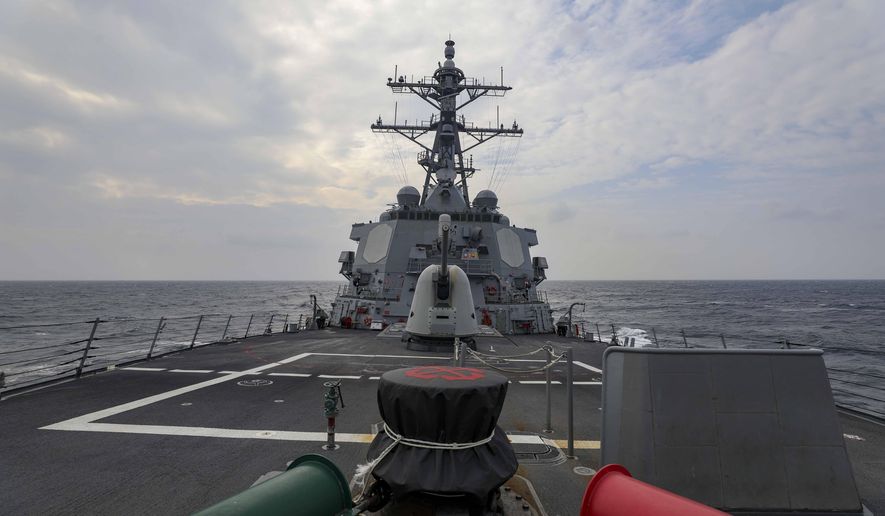Congress is moving forward with a plan to fast-track military aid to Taiwan in advance of a potential military invasion by China, even as President Biden seeks to cool tensions with Beijing that have heated up during his administration.
A bipartisan group of lawmakers is finalizing a package that would allow the U.S. military to tap into its own supply of armaments for Taipei, mirroring U.S. assistance to Ukraine in the face of Russia’s invasion.
The package, details of which were first reported by The Washington Post, could include anti-ship and anti-air defense missiles as well as self-detonating drones, naval mines and command-and-control equipment.
The proposed bill would provide weapons for the first time to Taiwan through the foreign military financing program paid for by the U.S. Lawmakers are moving to include the new aid in Congress’ must-pass annual defense policy bill, which the Senate is slated to take up as lawmakers return to Washington this week.
The package would allow the U.S. to send up to $1 billion worth of stockpiled munitions and up to $2 billion worth of weapons paid for by U.S. taxpayers annually over the next five years, though negotiations are continuing.
The bipartisan deliberations reflect a growing sense of urgency in Washington to support Taipei in the face of potential Chinese aggression.
SEE ALSO: Biden: No ‘imminent attempt’ by China to invade Taiwan after talks with Xi
“I think there’s a recognition by the administration and by Congress that we have to provide assistance,” said Senate Armed Services Committee Chairman Jack Reed, Rhode Island Democrat. “And we will consistent with the Taiwan Relations Act.”
The talks on Capitol Hill are being held as Mr. Biden seeks to assure world leaders that he can salvage U.S.-China relations following his first in-person meeting with Chinese President Xi Jinping since taking office.
Mr. Biden assured reporters Monday that tensions between the U.S. and China need not devolve into “a new cold war.”
The president said he had an “open and candid” conversation with Mr. Xi about a range of topics, including Beijing’s increasing provocations toward Taiwan.
“I don’t think there is any imminent attempt on the part of China to invade Taiwan. I made it clear that the U.S. policy on Taiwan has not changed at all,” Mr. Biden told reporters in Bali, Indonesia, shortly after his closed-door talk with his Chinese counterpart.
Mr. Biden’s remarks in Bali, though, offered little comfort to some lawmakers on Capitol Hill.
SEE ALSO: Taiwan tensions and push to prevent war shroud Biden’s meeting with China’s Xi
“I hope he knows what he’s talking about,” said Sen. Tommy Tuberville, Alabama Republican and member of the Senate Armed Services Committee. ”There’s a lot of smoke and there’s a lot of fire.”
Chinese officials have complained that U.S. arms shipments and high-profile contacts such as Democratic House Speaker Nancy Pelosi’s trip to the island in August have upset longstanding diplomatic understandings. Mr. Xi in a statement after the meeting called the Taiwan issue the “first red line” in U.S.-China relations.
Beijing has insisted that Taiwan is part of its territory and is determined to achieve a “peaceful reunification.” Last month, Mr. Xi vowed that China will “never commit to abandoning the use of force” to achieve that goal, adding that he would “take all necessary measures” to do so.
Under the “One China” policy, the U.S. acknowledges Beijing’s position that Taiwan is part of China, even though the U.S. maintains informal diplomatic relations and substantial defense ties with the island democracy — and does not technically recognize Chinese sovereignty over it.
Although Mr. Biden emphasized to Mr. Xi that the U.S. policy toward Taiwan has not changed, he said four times ahead of the talks that the U.S. would defend the island if Beijing were to attack.
Leaders in Congress said they hope to avoid another crisis similar to Ukraine and are pushing to preemptively arm Taiwan before any shots are fired.
Advocates say the aid is consistent with U.S. obligations under the Taiwan Relations Act, which outlines U.S. policy for aiding Taiwan’s self-defense.
Critics, however, question whether the new assistance would sufficiently bolster Taipei’s ability to defend itself in the near term.
• Jeff Mordock contributed to this report.
• Joseph Clark can be reached at jclark@washingtontimes.com.




Please read our comment policy before commenting.